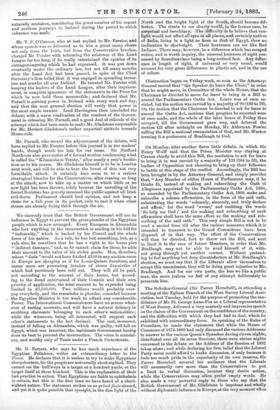On Monday, after another fierce little debate, in which Sir
Henry Wolff said that the Prime Minister was staying at Cannes chiefly to avoid this Bill, the resolution to ask for leave to bring it in was carried by a majority of 131 (184 to 53), the- leaders of Opposition not choosing to bring up their followers to battle at this stage of the conflict. Accordingly, the Bill has been brought in by the Attorney-General, and simply provides that, "Any Member of either House of Parliament may, if he thinks fit, instead of making and subscribing the Oath of Allegiance appointed by the Parliamentary Oaths Act, 1866,. as amended by the Parliamentary Oaths Act, 1868, make and subscribe a solemn affirmation, in the form of the said oath,. substituting the words 'solemnly, sincerely, and truly declare and affirm,' for the word 'swear,' and omitting the words So help me God ;' and the making and subscribing of such affirmation shall have the same effect as the making and sub- scribing of the said oath." This very simple Bill is not to be read a second time till after the various measures which it is intended to transmit to the Grand Committees have been disposed of in that way. The effort of the Conservatives will then be directed, first to throw out the Bill, and next to limit it to the case of future Members, in order that Mr. Bradlaugh may not be able to avail himself of it, with- out going through yet another contest. Without pretend- ing to feel anything but deep dissatisfaction at Mr. Bradlaugh's election, we must say that if the Liberals allow themselves to accept this amendment, they will be doing great injustice to Mr.. Bradlangh. And for our own parts, the less we like a public man, the more jealous we feel of any attempt deliberately to persecute him.


































 Previous page
Previous page